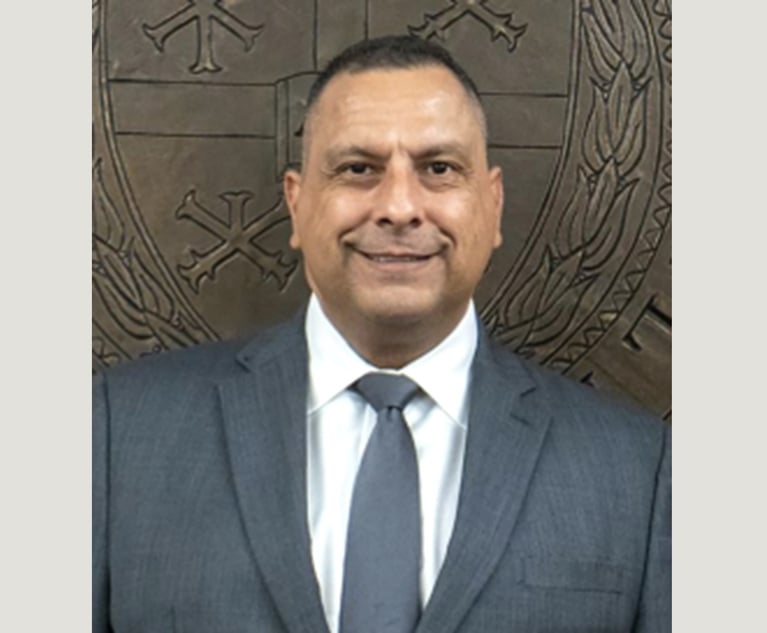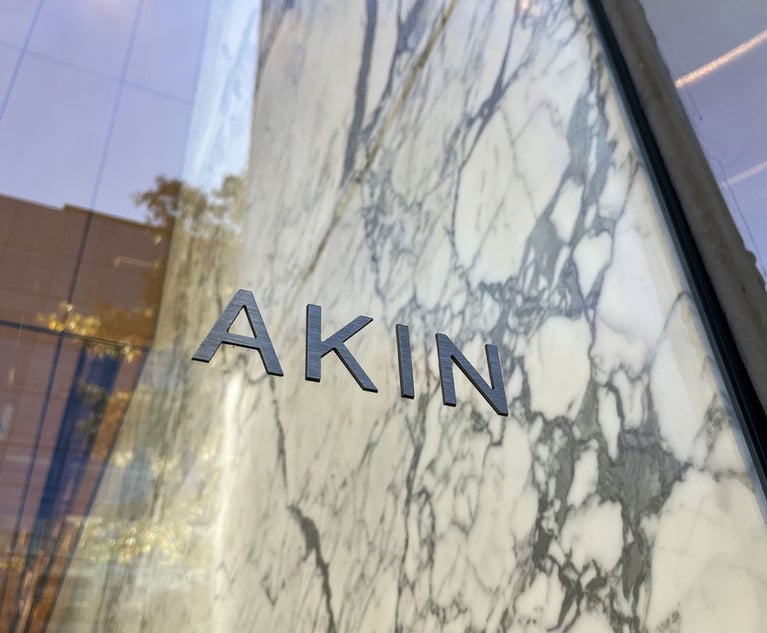 R. Keith Morris III, a shareholder with Munsch Hardt Kopf & Harr. Courtesy photo
R. Keith Morris III, a shareholder with Munsch Hardt Kopf & Harr. Courtesy photoCOVID-19 Has Increased Demand for Estate Planning. Here's How to Do It Right
Don't fall into the trap of thinking your assets will bypass the time and expense of probate by neglecting to complete a will. This could not be farther from the truth.
July 26, 2020 at 10:47 PM
5 minute read
These are unprecedented times, and it's completely natural for people to begin questioning whether they have legal affairs in order, so that their loved ones and assets are protected if the unexpected should happen. Surveys have shown more than half the population does not have an estate plan on file. Now, more than ever, it's a critical consideration for front-line health care workers in Houston's overwhelmed hospital systems. And based on recent guidance from the Houston Independent School District, the importance of estate planning extends to teachers. The fact remains that it's good advice for every individual to have an estate plan, regardless of an immediate health threat.
Before the novel coronavirus pandemic, an individual and her attorney would meet in person to discuss estate planning goals, as well as complete a detailed questionnaire to further assist the attorney in drafting the initial documents. A typical estate plan includes a last will and testament, a statutory durable power of attorney, a medical power of attorney, directive to physicians and sometimes a trust. It generally takes one week to prepare and assemble the various documents before the attorney can send them out for the client's review. Once the client is satisfied the estate planning documents reflect the proper disposition of her estate and whom she wants to manage her financial and health care decisions, she would then typically go to the attorney's office for the execution ceremony. To properly execute a will in Texas, this previously required the signatory, two disinterested witnesses and a notary to all be present at the same time.
However, under current conditions, clients no longer need to meet face-to-face with an attorney, but can conduct consultations by phone and questionnaires electronically. Thankfully on April 9, Gov. Greg Abbott temporarily suspended statutes requiring in-person appearances for notary publics, specifically referencing the execution of self-proven wills, durable powers of attorney, medical powers of attorney, directive to physicians and oaths of executors, administrators or guardians. The suspension of these statutes allows the notary to appear via videoconference to verify the identification of the signatories during the COVID-19 pandemic. The specific rules allow a notary to (a) verify the identity at the time the document is signed by use of two-way video and audio technology; (b) verify the identity of the signatory of the document, either through personal knowledge of the signatory or the visual presentation of a government-issued identification, such as a passport or driver's license, with the signatory's name, signature and photograph; and (c) the signatory will send a legible copy of the signed document electronically to the notary, then the notary will sign, notarize and transmit the document back to the signatory electronically. Finally, at that point, the notarization is complete and valid. The suspension will remain in effect until the disaster declaration is lifted or expires, and the notarized document will remain valid after the suspension is lifted.
For individuals with a critical need to move quickly on drafting an estate plan for the first time, the following is timely and sound legal advice. First, speak with a licensed attorney on how you should proceed in lieu of the new realities we're currently facing. Second, once an in-person or teleconference appointment has been set, come prepared to discuss the following:
- Have I made a will? Every state creates a "state-written will" for those who have not made their own. If you neglect to make a will, there's a chance your wishes will not be met.
- Have I completed a living will? This is an uncertain and unprecedented time, especially for at-risk, front-line workers. If you currently suffer from a compounding health condition, directives contained a living will could sustain your life in the event of an emergency.
- Have I designated beneficiaries for all my assets? When deceased, your named beneficiary will receive your assets according to your precise instructions. Consider naming close family members or a charity of great importance to you personally.
- Have I considered introducing a timeline? If your children are still minors, it might make sense to delay the disbursement of assets, including trusts.
- Do I have a plan for joint ownership? If one of the designated owners passes away, the survivor free of probate will receive the assets in his or her entirety.
Don't fall into the trap of thinking your assets will bypass the time and expense of probate by neglecting to complete a will. This could not be farther from the truth. If you pass away without a will, your assets will still go through a probate hearing. Furthermore, once your will is complete, don't forget to update it following major life milestones, including marriage, divorce, births, etc. In light of the current situation, there is no better time than now to get your estate planning affairs in order. But be sure to conduct the due diligence necessary to get it done right.
R. Keith Morris III is a shareholder in Munsch Hardt Kopf & Harr's Dallas office. He has devoted his practice to probate, guardianship and fiduciary administration and litigation since the start of his education. Morris represents people, small businesses and corporations and has tried numerous cases to verdict. He has also been appointed by Harris County and many other counties in Texas to serve in a fiduciary capacity as ad litem, administrator and guardian. He can be reached at [email protected].
This content has been archived. It is available through our partners, LexisNexis® and Bloomberg Law.
To view this content, please continue to their sites.
Not a Lexis Subscriber?
Subscribe Now
Not a Bloomberg Law Subscriber?
Subscribe Now
NOT FOR REPRINT
© 2025 ALM Global, LLC, All Rights Reserved. Request academic re-use from www.copyright.com. All other uses, submit a request to [email protected]. For more information visit Asset & Logo Licensing.
You Might Like
View All
Bracewell Adds Former Pioneer Natural Resources Lawyer to O&G, Energy Transition Practices
2 minute read

Ex-Jenkens & Gilchrist Lawyer Convicted in Tax Shelter Scheme is Among Biden's Commutations
3 minute read
Law Firms Mentioned
Trending Stories
Who Got The Work
Michael G. Bongiorno, Andrew Scott Dulberg and Elizabeth E. Driscoll from Wilmer Cutler Pickering Hale and Dorr have stepped in to represent Symbotic Inc., an A.I.-enabled technology platform that focuses on increasing supply chain efficiency, and other defendants in a pending shareholder derivative lawsuit. The case, filed Oct. 2 in Massachusetts District Court by the Brown Law Firm on behalf of Stephen Austen, accuses certain officers and directors of misleading investors in regard to Symbotic's potential for margin growth by failing to disclose that the company was not equipped to timely deploy its systems or manage expenses through project delays. The case, assigned to U.S. District Judge Nathaniel M. Gorton, is 1:24-cv-12522, Austen v. Cohen et al.
Who Got The Work
Edmund Polubinski and Marie Killmond of Davis Polk & Wardwell have entered appearances for data platform software development company MongoDB and other defendants in a pending shareholder derivative lawsuit. The action, filed Oct. 7 in New York Southern District Court by the Brown Law Firm, accuses the company's directors and/or officers of falsely expressing confidence in the company’s restructuring of its sales incentive plan and downplaying the severity of decreases in its upfront commitments. The case is 1:24-cv-07594, Roy v. Ittycheria et al.
Who Got The Work
Amy O. Bruchs and Kurt F. Ellison of Michael Best & Friedrich have entered appearances for Epic Systems Corp. in a pending employment discrimination lawsuit. The suit was filed Sept. 7 in Wisconsin Western District Court by Levine Eisberner LLC and Siri & Glimstad on behalf of a project manager who claims that he was wrongfully terminated after applying for a religious exemption to the defendant's COVID-19 vaccine mandate. The case, assigned to U.S. Magistrate Judge Anita Marie Boor, is 3:24-cv-00630, Secker, Nathan v. Epic Systems Corporation.
Who Got The Work
David X. Sullivan, Thomas J. Finn and Gregory A. Hall from McCarter & English have entered appearances for Sunrun Installation Services in a pending civil rights lawsuit. The complaint was filed Sept. 4 in Connecticut District Court by attorney Robert M. Berke on behalf of former employee George Edward Steins, who was arrested and charged with employing an unregistered home improvement salesperson. The complaint alleges that had Sunrun informed the Connecticut Department of Consumer Protection that the plaintiff's employment had ended in 2017 and that he no longer held Sunrun's home improvement contractor license, he would not have been hit with charges, which were dismissed in May 2024. The case, assigned to U.S. District Judge Jeffrey A. Meyer, is 3:24-cv-01423, Steins v. Sunrun, Inc. et al.
Who Got The Work
Greenberg Traurig shareholder Joshua L. Raskin has entered an appearance for boohoo.com UK Ltd. in a pending patent infringement lawsuit. The suit, filed Sept. 3 in Texas Eastern District Court by Rozier Hardt McDonough on behalf of Alto Dynamics, asserts five patents related to an online shopping platform. The case, assigned to U.S. District Judge Rodney Gilstrap, is 2:24-cv-00719, Alto Dynamics, LLC v. boohoo.com UK Limited.
Featured Firms
Law Offices of Gary Martin Hays & Associates, P.C.
(470) 294-1674
Law Offices of Mark E. Salomone
(857) 444-6468
Smith & Hassler
(713) 739-1250






